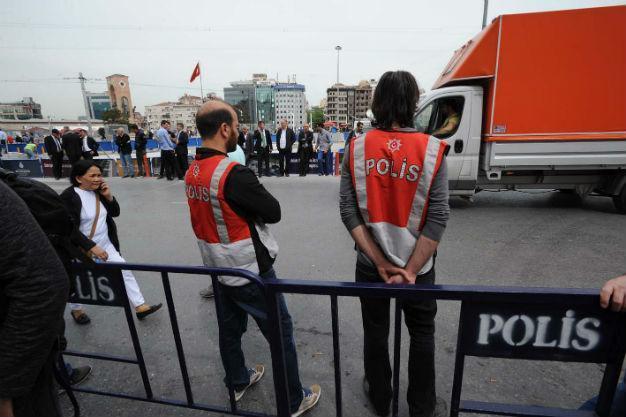Security lockdown in Istanbul for International Workers’ Day
ISTANBUL

DHA photo
Istanbul is set to mark May 1, International Workers’ Day, in a different venue than the contested and symbolic Taksim Square due to security concerns, with this year’s celebrations to be held in the Bakırköy bazaar area amid tight security measures.Up to 15,000 policemen, three police helicopters and 120 water cannon (TOMA) will be on duty across Istanbul, as part of security precautions that will consist of four levels, security sources told Anadolu Agency on April 28.
Reinforcements will be ready to be sent to the area if necessary.
Tight security measures will be taken at the metro and bus stations that are on the route to Bakırköy, in the gathering spots for participants and union members, on the roads that the groups will use to march to the meeting area and in the meeting spot.
Water cannon, police helicopters and trained dogs will support some 6,000 police officers, including bomb disposal specialists, who will be on duty in Bakırköy.
Taksim Square has symbolic meaning for the Turkish left, as over 30 people were killed in 1977 when suspected nationalists opened fire on May Day participants from what is now the Marmara Hotel.
Although recognized as an official holiday, May Day celebrations have not been permitted in Taksim Square since 2012.
Up to 500,000 people are expected to gather in Bakırköy, with the participation of workers’ unions and the representatives of the political parties.
The security measurements came after a series of suicide attacks organized by both the Islamic State of Iraq and the Levant (ISIL) and the Kurdistan Freedom Hawks (TAK), a group linked to the outlawed Kurdistan Workers’ Party (PKK).
Two ISIL suicide bombers detonated themselves on Oct. 10, 2015, in front of Ankara’s main train station, where thousands of people had gathered for a peace rally a few weeks before a snap election on Nov. 1, 2015. The attack killed 101 protesters, making it the largest terrorist attack in Turkey’s history. ISIL also hit Istanbul’s historic Sultanahmet Square on Jan. 12, as well as the city’s touristic İstiklal Avenue on March 19.
A female suicide bomber also detonated herself on April 27 near Ulu Cami, a mosque in the center of Bursa, killing herself and wounding 13 others.
















